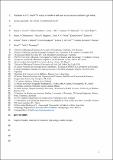Variation in δ13C and δ15N values of mothers and their calves across southern right whale nursery grounds : the effects of nutritional stress?
Abstract
Southern right whales (SRW) are capital breeders that use stored energy reserves to sustain themselves and their calves on nursery areas. With successful calving events declining in some SRW populations, it has been hypothesized that nutritional stress in adult females causes reproductive failure or death of calves shortly after birth. Here we compared offsets in carbon and nitrogen isotope values of mothers and their offspring (Δ13Ccalf-cow and Δ15Ncalf-cow) among three SRW populations. SRW from Aotearoa New Zealand, with high population growth rates and body conditions scores, have negative Δ13Ccalf-cow suggesting calves are utilizing 13C-depleted lipid carbon in milk to fuel the synthesis of nonessential amino acids used to build new tissues and rapidly grow. In contrast, a significantly positive Δ13Ccalf-cow offset previously reported for SRW from Argentina during a mass die-off event was hypothesized to be due to calves consuming milk with low lipid content. Patterns in Δ15Ncalf-cow were more difficult to interpret and highlight the complexity in nitrogen transfer between mother and offspring. When combined with similar data collected from Brazil and during a low mortality year in Argentina, we hypothesize this approach provides a way to retrospectively compare nutritional condition of breeding adult female SRW across nursery areas.
Citation
Carroll , E L , Dunshea , G , Ott , P H , Valenzuela , L O , Baker , C S , Childerhouse , S J , Gaggiotti , O E , Flores , P A C , Groch , K , Gröcke , D R , Hindell , M A , Lundquist , D , Oliveira , L R , Rowntree , V , Sironi , M & Newsome , S D 2021 , ' Variation in δ 13 C and δ 15 N values of mothers and their calves across southern right whale nursery grounds : the effects of nutritional stress? ' , Marine Mammal Science , vol. Early View . https://doi.org/10.1111/mms.12871
Publication
Marine Mammal Science
Status
Peer reviewed
ISSN
0824-0469Type
Journal article
Description
Funding: E.L.C. is supported by a Rutherford Discovery Fellow from the Royal Society of New Zealand Te Apārangi. Stable isotope analyses were supported by a Marie Curie fellowship to E.L.C. (Brazilian samples) and an Australian Marine Mammal Centre grant to G.D., S.C., M.H. (New Zealand samples). P.H.O. was supported by the Brazilian National Research Council (CNPq proc. n° 144064/98-7) and World Wildlife Fund (WWF-Brazil). The New Zealand biopsy samples were collected under New Zealand Department of Conservation Marine Mammal Research permit and University of Auckland Animal Ethics Committee approved protocol AEC/02/2005/R334 to CSB. The New Zealand field work was funded by a Winifred Violet Scott Estate Research Grant Fund, Australian Antarctic Division, Marine Conservation Action Fund, Blue Planet Marine NZ Ltd, Holsworth Wildlife Research Endowment, New Zealand Ministry of Foreign Affairs, DOC, South Pacific Whale Research Consortium, National Geographic, and Brian Skerry Photography.Collections
Items in the St Andrews Research Repository are protected by copyright, with all rights reserved, unless otherwise indicated.

